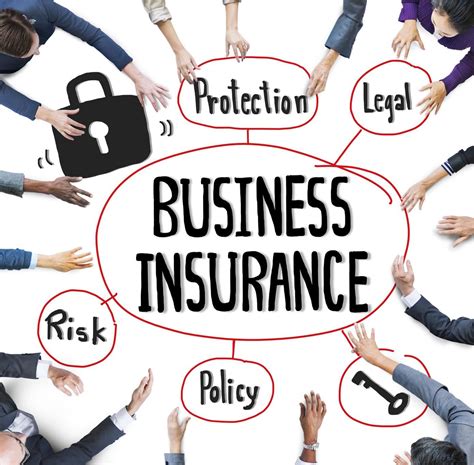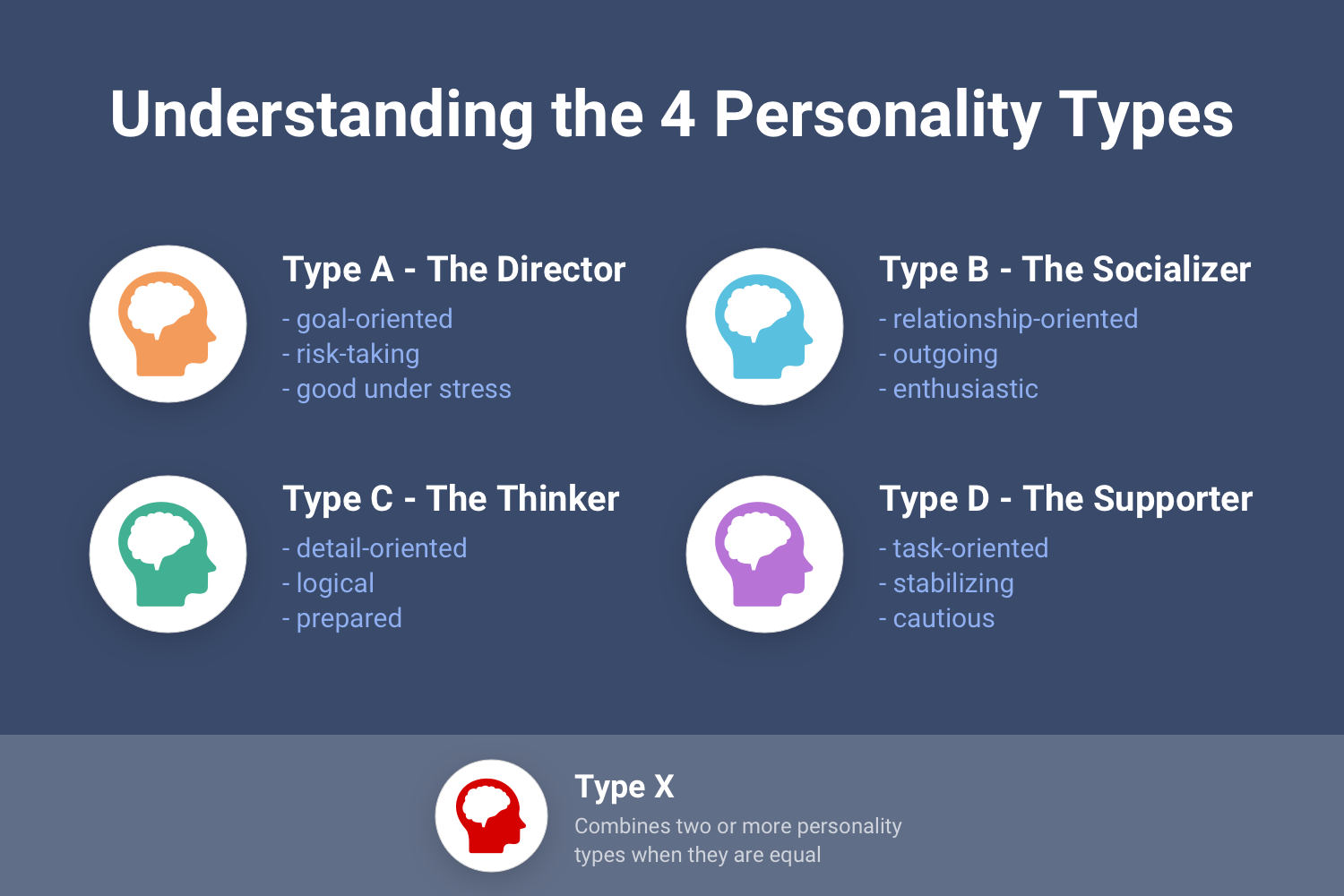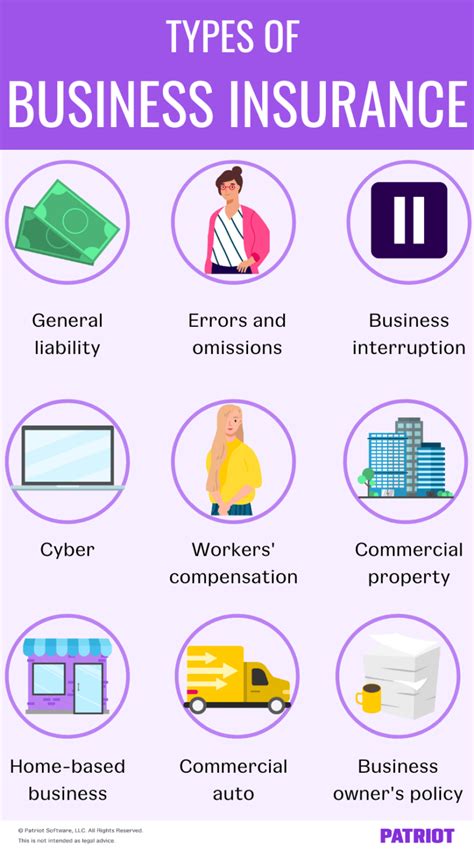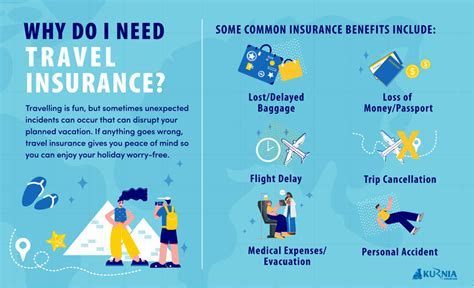Insurances For Businesses

In today's complex business landscape, understanding the intricacies of insurance is paramount for entrepreneurs and business owners. Insurance acts as a safeguard, providing protection against unforeseen events and mitigating risks that could otherwise cripple a business. From natural disasters to cyber attacks and employee injuries, the range of potential threats is vast and ever-evolving. This article aims to provide an in-depth exploration of the world of business insurance, offering valuable insights to help navigate this critical aspect of business management.
Navigating the Complex World of Business Insurance

Business insurance is a multifaceted field, offering coverage for a broad spectrum of risks. For a business owner, selecting the right insurance policies can be a daunting task, given the myriad of options and the potential consequences of inadequate coverage. This section provides an overview of the key types of business insurance and their relevance to different enterprises.
Commercial Property Insurance
Commercial property insurance is a fundamental protection for any business owner. This policy provides coverage for physical assets such as buildings, inventory, and equipment. In the event of damage or loss due to perils like fire, storms, or vandalism, commercial property insurance can offer financial relief, helping businesses rebuild and replace lost assets.
Consider the case of a small retail store located in a region prone to hurricanes. Commercial property insurance would cover the cost of repairing or rebuilding the store, replacing damaged inventory, and even providing temporary storage for goods until the business can resume operations.
| Coverage Area | Potential Risks |
|---|---|
| Buildings | Fire, Storm Damage, Flooding |
| Inventory | Theft, Damage, Spoilage |
| Equipment | Malfunction, Breakdowns, Theft |

Liability Insurance
Liability insurance is a broad category that covers a range of potential claims against a business. This could include everything from injuries sustained on the business premises to claims of professional negligence or product defects.
For instance, a consulting firm might face a lawsuit alleging negligence in their advice, leading to significant financial losses for the client. Liability insurance would step in to cover the costs of defending the lawsuit and any damages awarded.
| Liability Type | Coverage |
|---|---|
| General Liability | Covers claims of bodily injury or property damage caused by your business operations |
| Professional Liability (E&O) | Protects against claims of negligence or errors in professional services |
| Product Liability | Covers claims arising from defective products sold by your business |
Business Interruption Insurance
Business interruption insurance provides a safety net for businesses during periods when operations are suspended due to covered perils. This could include situations like a fire that renders the business premises uninhabitable or a natural disaster that disrupts supply chains.
Imagine a restaurant forced to close due to a kitchen fire. Business interruption insurance would provide coverage for lost income during the closure period, as well as additional expenses like the cost of relocating to a temporary kitchen.
| Coverage Area | Benefits |
|---|---|
| Lost Income | Replaces revenue lost due to a covered event |
| Extra Expenses | Covers additional costs incurred to continue operations during the disruption |
Workers’ Compensation Insurance
Workers’ compensation insurance is a statutory requirement in most states, designed to protect both employees and employers in the event of workplace injuries or illnesses. This insurance provides medical benefits and wage replacement for employees who are injured or become ill due to their work.
Consider a construction worker who suffers a severe injury on the job. Workers' compensation insurance would cover the cost of their medical treatment and a portion of their lost wages while they recover.
| Coverage Area | Benefits |
|---|---|
| Medical Care | Covers the cost of treating work-related injuries or illnesses |
| Wage Replacement | Provides a percentage of the employee's regular wages during their recovery period |
Cyber Insurance
In today’s digital age, businesses face a unique set of risks related to cyber threats. Cyber insurance is a specialized policy designed to protect businesses from financial losses resulting from cyber attacks, data breaches, and other online risks.
A small business might fall victim to a ransomware attack, which encrypts their data and demands a payment for its release. Cyber insurance would cover the costs of resolving the attack, including any ransom paid, as well as providing support for crisis management and public relations.
| Coverage Area | Potential Risks |
|---|---|
| Cyber Attack | Ransomware, Malware, Hacking |
| Data Breach | Theft or Exposure of Customer Data |
| Cyber Extortion | Demands for Payment to Prevent or Resolve a Cyber Attack |
Tailoring Insurance to Your Business’s Unique Needs

While the types of insurance outlined above provide a solid foundation for business protection, every business is unique and may require additional coverage to address specific risks. This section delves into the process of customizing insurance to fit the unique needs of a business.
Assessing Your Business’s Risks
The first step in tailoring insurance is to conduct a comprehensive risk assessment. This involves identifying potential threats to your business, both from internal and external sources. Internal risks might include employee errors or theft, while external risks could encompass natural disasters, cyber attacks, or changes in the economic environment.
A manufacturing business, for instance, might face internal risks like machinery malfunctions or product defects, while external risks could include supply chain disruptions or changes in consumer demand.
Working with an Insurance Professional
Once you’ve identified your business’s unique risks, the next step is to consult with an insurance professional. These experts can guide you through the process of selecting and tailoring insurance policies to meet your specific needs. They can advise on the appropriate levels of coverage, deductibles, and any additional endorsements or riders that might be necessary.
An insurance broker might recommend a business owner consider an endorsement to their liability policy to cover advertising injuries, which could arise from claims of defamation or copyright infringement in the business's marketing materials.
Regular Review and Adjustment
Insurance needs are not static. As your business grows, changes direction, or faces new challenges, your insurance requirements will likely evolve as well. Regular reviews of your insurance portfolio, ideally conducted annually or after significant business changes, are essential to ensure your coverage remains adequate and appropriate.
For instance, a startup that begins to offer online services might need to add cyber insurance to their portfolio to protect against potential cyber threats. Or, a business that expands into a new market might need to adjust their liability coverage to account for regional differences in legal requirements.
The Impact of Insurance on Business Resilience and Growth
Insurance is more than just a financial safety net; it’s a critical component of a business’s long-term resilience and growth strategy. By providing protection against a range of risks, insurance enables businesses to focus on their core operations and strategic objectives, rather than being distracted by the financial and operational fallout of unexpected events.
Financial Protection and Stability
At its core, insurance provides financial protection, helping businesses manage the financial impact of unexpected events. Whether it’s a natural disaster, a cyber attack, or a lawsuit, insurance policies can cover the costs of repairing damage, replacing lost assets, or defending legal claims.
Consider a small business that experiences a major data breach. Without cyber insurance, the cost of resolving the breach, notifying affected customers, and potentially paying fines or settlements could be devastating. With cyber insurance, the business has the financial support it needs to navigate this crisis.
Enabling Business Continuity
Insurance plays a vital role in ensuring business continuity. By providing coverage for lost income and additional expenses during periods of disruption, business interruption insurance helps businesses weather the storm and resume operations as quickly as possible.
A restaurant affected by a severe storm might need to close for repairs. With business interruption insurance, the restaurant can continue to pay its employees and other ongoing expenses, ensuring it can reopen and serve its customers as soon as repairs are complete.
Enhancing Reputation and Customer Trust
Insurance can also have a positive impact on a business’s reputation and customer trust. By demonstrating a commitment to risk management and financial responsibility, businesses can enhance their credibility and build stronger relationships with customers, suppliers, and partners.
A business that prioritizes insurance coverage and regularly reviews its policies to ensure adequacy sends a clear message to its stakeholders: we are prepared and responsible, and we value our relationships.
Conclusion
In conclusion, understanding and managing insurance is a critical aspect of business ownership and management. By navigating the complex world of business insurance, tailoring policies to unique needs, and recognizing the impact of insurance on business resilience and growth, entrepreneurs can make informed decisions that protect their businesses and enable long-term success.
Remember, insurance is not a one-size-fits-all solution. It requires careful consideration, regular review, and the guidance of experienced professionals. By investing time and resources into understanding and managing insurance, business owners can ensure their enterprises are adequately protected, now and in the future.
FAQ

What is the difference between general liability and professional liability insurance?
+General liability insurance covers a broad range of common risks, such as bodily injury, property damage, and advertising injuries. On the other hand, professional liability insurance, also known as Errors and Omissions (E&O) insurance, is more specialized. It’s designed to protect professionals, like consultants, accountants, or architects, against claims of negligence or errors in their professional services. General liability insurance is a basic protection for most businesses, while professional liability insurance is typically needed for businesses that provide professional advice or services.
How does business interruption insurance work in practice?
+Business interruption insurance kicks in when a business is forced to suspend or reduce operations due to a covered event, such as a fire, storm, or a cyber attack. It provides coverage for lost income and additional expenses during this period of disruption. For example, if a restaurant is forced to close due to a fire, business interruption insurance would cover the restaurant’s lost revenue and any additional costs, like temporary relocation to a different kitchen, until the restaurant can reopen.
What are some common exclusions in business insurance policies?
+Business insurance policies often exclude certain types of risks or events. Common exclusions may include war or acts of war, nuclear incidents, intentional acts or fraud by the insured, and normal wear and tear on property. It’s important to carefully review your policy’s exclusions to understand what events or risks are not covered. This can help you determine if you need additional coverage or if you should take steps to mitigate these risks.
How can I save money on business insurance premiums?
+There are several strategies you can employ to reduce your business insurance premiums. First, conduct a thorough risk assessment to identify areas where you can mitigate risks and potentially reduce the need for certain types of coverage. Second, consider raising your deductibles, which can lower your premium but increase your out-of-pocket costs if a claim is made. Third, maintain a good loss history. Insurance companies reward businesses that have a low frequency of claims. Finally, bundle your policies with a single insurer. Many insurers offer discounts for customers who purchase multiple policies.



